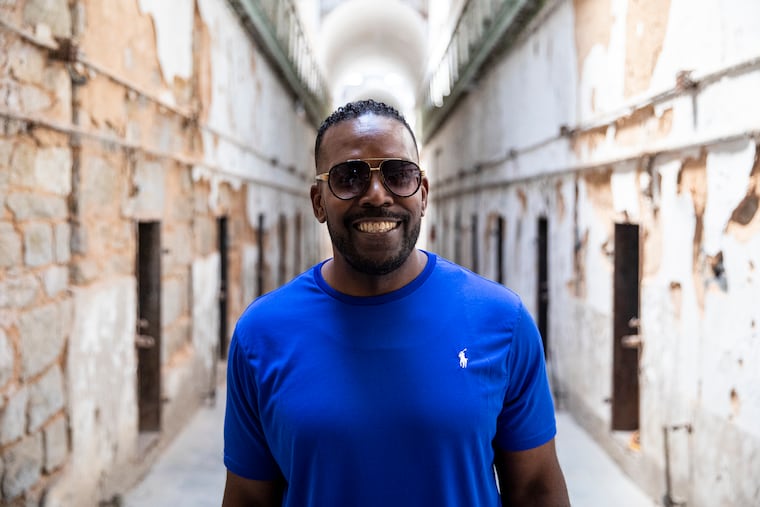Free after a decade in prison, Philly man says police faked evidence in his case
Jerome Loach was cleared of a 2009 home invasion robbery that occurred while he was acting in a gospel play several miles away.

Without fanfare, in June, Jerome Loach joined the growing list of Philadelphians cleared of all charges after more than a decade in prison. He had been serving a 25- to 50-year sentence for a home-invasion robbery that took place while he was acting in a gospel play several miles away.
His homecoming came in the form of the unceremonious removal of a house-arrest ankle monitor about a year after his conviction was overturned.
Loach recently filed a civil lawsuit alleging “egregious misconduct” by Philadelphia police detectives, who he said had threatened him with the arrest of his son, hid information proving his codefendant had lied, and fabricated phone records to tie him to the crime.
In July 2020, the Philadelphia District Attorney’s Conviction Integrity Unit agreed Loach had been wrongfully convicted — but did not concede his innocence. Instead, the DA offered a plea deal that would have made Loach eligible for immediate parole.
“He was adamant in regard to his innocence, and he rejected it,” said Loach’s lawyer, Michael Pileggi.
After Common Pleas Court Judge Tracy Brandeis-Roman vacated Loach’s conviction, it took a full year for the DA to agree not to retry him. His case exemplifies how the already narrow road to exoneration can be even more perilous without unequivocal support from the District Attorney’s Office’s unit charged with reviewing cases for wrongful convictions.
Loach, 55, who had a serious criminal record, including convictions for armed robbery and aggravated assault when he was younger, said he had served his time and transformed his life in middle age.
He was running a barbershop before his arrest, he said, trying to provide job opportunities to those coming home from prison. He also helped out his sister, a minister, by performing in religious plays like one on the evening of Jan. 10, 2009, called “Clean Up Your Own Mess,” at a church in South Philadelphia.
But detectives said a forensic cell phone analysis showed dozens of calls and texts placing him in West Philadelphia that night, colluding with two young men who forced their way into a home at gunpoint. One of the men, Sopheap Phat, who worked in his barbershop, also gave a statement against Loach — but recanted before the trial, saying he had lied because he was threatened with deportation.
» READ MORE: Philadelphia's exonerations call decades of police homicide investigations into question
After years of telling his lawyers the phone report was wrong, Loach finally filled out a subpoena himself and submitted it to Sprint.
He was aware he didn’t have subpoena power, he said. “For whatever reason, the phone company thought I may be part of the DA’s Office, and they gave me the records.”
The records conflicted with the evidence implicating Loach presented at trial by Detectives John Druding and Christopher Tankelewicz.
Druding is deceased; Tankelewicz did not respond to an interview request.
At a hearing last year, CIU supervisor Patricia Cummings agreed that there were “problems with his conviction” and that it should be overturned. However, she opposed his release on bail and his exoneration.
She offered a new sentence of nine to 18 years, by “demandatorializing” Loach’s conviction. “That ‘demando’ is not likely to happen again if this office chooses to retry you,” she advised, adding that, if retried, Loach “could get, again, 25 years to 50 years.” She also noted that prosecutors could choose to pursue the theory that he was a coconspirator in the planning of the crime, rendering his alibi defense irrelevant.
» READ MORE: The battle in Philly DA’s Office: Conviction Integrity Unit report shows rocky path to reform
The judge, Brandeis-Roman, found that Loach’s lawyer was ineffective for failing to call what she said was a credible alibi witness. She also found that the failure to disclose the accurate phone records amounted to misconduct.
The District Attorney’s Office, in dropping the case, did not affirm Loach’s innocence. Instead, spokesperson Jane Roh said, “After they reviewed the case, they determined they had insufficient evidence to prosecute.”
Loach, during his years at the State Correctional Institution Chester, worked with a team from Eastern State Penitentiary, creating animated films about incarceration to project on the prison museum’s walls.
He lost his barbershop while he was locked up — but his collaboration in prison may have opened a new door. He recently applied to work for one of Eastern State’s reentry programs.
“That would be everything coming full circle,” he said. He recently stopped by to visit the mentors he’d met during the filmmaking process, to see the walls where his art had been projected.
Though it took years, and Loach had to overcome the DA’s opposition, Loach said he’s just grateful he had his day in court.
“What Patricia Cummings and DA Larry Krasner are doing, giving men the opportunity to be heard, is something unique. That wasn’t done in Philadelphia in the past,” he said, referring to the nearly two dozen exonerations during Krasner’s tenure and the scores of other cases his office has agreed to review. “That’s Philadelphia turning the page.”